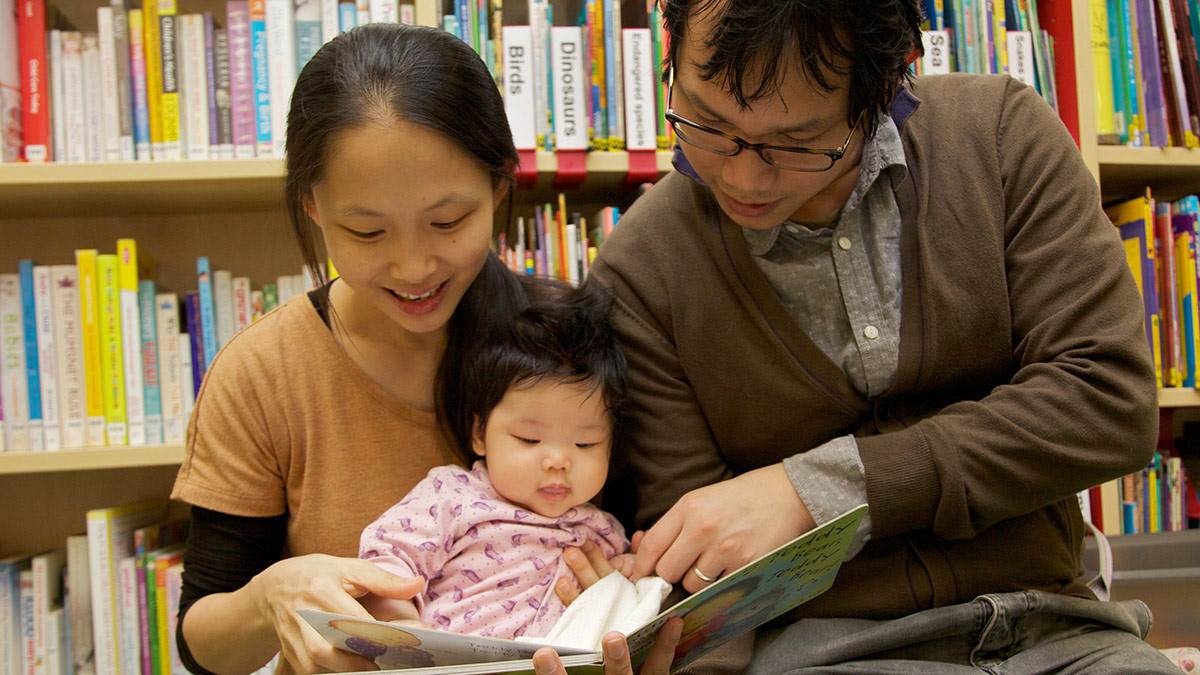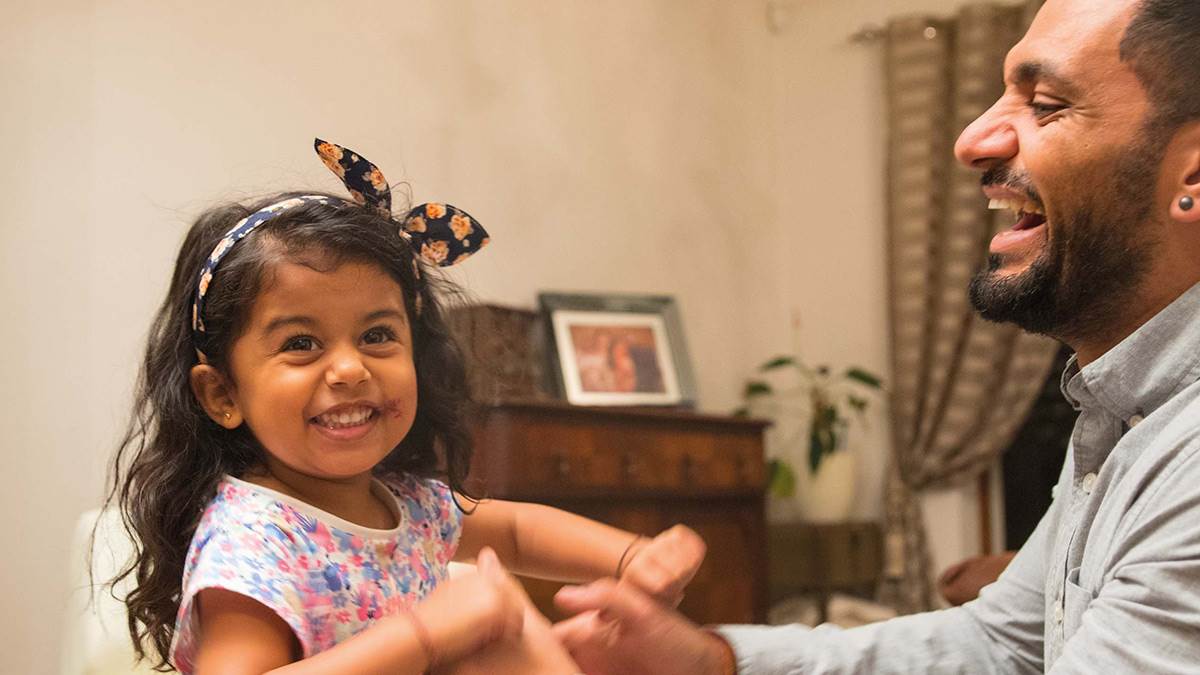Engaging dads and male carers
When delivering Bookstart programmes, it’s important that the whole family is part of the process and that dads and male carers don’t miss out on the benefits that sharing books, stories and rhymes can bring to them and their children.
For many different reasons – from external commitments to a feeling that sessions such as Rhymetimes are 'not for them' – it can often be hard to get dads and male carers to engage with services, and to keep them returning.
Here are some tips and advice on getting dads and male carers through the door - and keeping then involved with the vital services you offer.

Getting dads and male carers through the door
Create a dad / male carer-friendly environment
Ten tips to help dads and male carers feel welcome:
- Display positive images of dads / male carers and children that reflect the diversity of the population
- Make a positive effort to talk to dads / male carers - get to know their names and their children’s names, acknowledge the importance of their role and make sure they know about and feel welcome to attend the services you offer
- Use any noticeboards to include information that's interesting to dads / male carers, such as services, groups and courses
- Collect registration information to identify all the people who are significant in providing care for the children
- Try holding evening or weekend events - many dads / male carers find it hard to attend on weekdays
- Make sure the dads' / male carers’ roles and interests are reflected in the reading materials, toys or activities that you provide
- If possible, include male members of staff or volunteers
- Encourage dads / male carers who already use your services to invite other dads / male carers into your setting
- Make sure dads / male carers know where the toilets and nappy changing facilities are
- Think about dads / male carers who may have additional needs for you to consider - for example, because they are disabled, where English is their second language or because they are young dads / young male carers
Identify barriers and use local partners to gain access to your target group
When promoting Bookstart, it’s important to think about the barriers that may exist to dads engaging with groups or settings that promote a love of sharing books, stories and rhymes. Addressing these barriers can really help get them involved and experience all the benefits that brings.
Bookstart Coordinators in areas with strong local partnerships talk of a sense of common purpose and shared outcomes which lead them to act as ambassadors for each other’s work.
Such local partners can help to identify, recruit and support dads / male carers around reading for pleasure – and gain access to those already engaged – through:
- Children’s centre groups
- Family learning courses
- Library services
- Health provision
- Voluntary-sector groups
- Self-help and specific support groups

Hooks are a valuable tool to attract dads and male carers
The most popular and successful of these include:
Sport
Many dads / male carers are particularly attracted to events themed around sport. Some libraries work with their local football and/or rugby club to promote books and reading with children and their dads. Footballers with young children may be willing to attend sessions to share their favourite books and rhymes, thereby acting as role models for the children as well as and the dads/male carers.
Food
Many groups find that providing food is attractive to dads / male carers and also helps to promote healthy eating. It can provide a social focus for a group and create a relaxed atmosphere, which helps dads and children get to know each other better and helps the group become more cohesive.
One-off events
Special events can be a great way to target dads / male carers. Some libraries run Father's Day events with indoor and outdoor activities, with the incentive of free DVD hire for attending. Many Bookstart Coordinators play an active role in family fun days or local shows, setting up stalls and running Rhymetime or storytime sessions for the under-5s.
Keeping them coming back
Once you’ve been successful in attracting dads / male carers to your event, session or group, it’s important that you create an environment that will make them want to stay involved. The following factors have been identified as encouraging this:
- The group needs to be inclusive and dads / male carers need to be made to feel welcome. Having fun will also make them want to come back again
- Encouraging suggestions and feedback from the dads / male carers, and acting on them, will help develop a sense of ownership and direction for the group
- Showing that you value dads / male carers and the importance of their contribution to their children’s lives will help them feel included
- Children are great motivators – their pleasure and enjoyment will bring dads / male carers back to future events and activities
- Dads / male carers have the chance to enjoy the special bond they share in the activities, and feel the pride of seeing their children’s achievements
- Dads / male carers can enjoy the camaraderie of other men and of spending time with other children. This can be built by encouraging regular attendees to support newer members, or by having a social time during or after the session
Promote a positive and proactive approach by staff
Staff play a key role in creating an environment where dads / male carers are treated with respect, feel comfortable and gain enjoyment.
When working with dads / male carers, the key ingredients of success are:
- Offering dads / male carers and children a high-quality experience by ensuring there is a positive atmosphere so that everyone has fun and wants to come back next time
- Having session leaders who are confident, skilled and sensitive to the needs of both the dads / male carers and the children in the groups
- Creating an inclusive and respectful environment, which breaks down any tendency for cliques to develop
- Using a welcoming and visually attractive location and running sessions at times dads / male carers are able to attend
- Training all staff to understand the importance of engaging dads / male carers, and their role in generating a welcoming, friendly and respectful atmosphere
- Making the setting visually exciting, physically comfortable and, where possible, offering access to other play activities, such as water, sand or craft opportunities
As dads / male carers become more relaxed and get to know and trust the staff, they are more likely to seek information and advice about a range of issues, giving staff the opportunity to signpost them to other services. This will broaden the impact of the service for children and families and promote partnership working.

Emphasise the need for an adaptable approach
Staff also need to be able to adapt their approach to the needs of the group members. For example, some parents can initially feel nervous about attending groups or worry that their children will misbehave and cause them embarrassment.
Staff need to be skilled at supporting dads / male carers in these situations in a way that is not patronising and recognises that, with their own children, parents are the experts. Helping the children settle and intervening early and sensitively to maintain children’s engagement provides reassurance for the dads / male carers and raises their confidence in attending the sessions.
The personality and style of the person leading the session is also central to success. It is important to be flexible, to be responsive to the group and to adapt session plans to provide activities that maximise enjoyment and engagement of the babies, children and adults.
Above all, the sessions must be fun for everyone and the leader must transmit the sense of fun and pleasure they are getting from taking part. It is also important that the leader can show that mistakes can be made or things can go wrong and everyone can laugh about it. This promotes a relaxed atmosphere and group cohesion.
